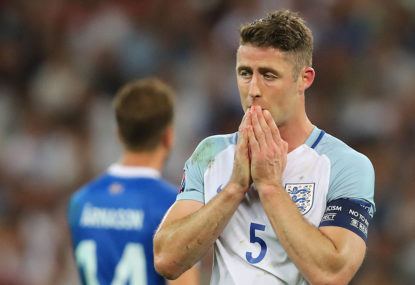They don’t care. They’re soft. They’re weak. They don’t take responsibility. They’re overpaid. Overrated.
There’s too much pressure. They can’t handle the media. They don’t work hard enough. They’re overworked. They’re scared.
They’re egomaniacs. Their domestic season is too taxing. They’re cursed. The shirt is cursed. The fans create a stressful atmosphere.
Maybe the only thing the English do better than crashing out of international tournaments is coming up with reasons as to why.
But for mine, as true as some of these factors may be, they all fail to hit the core issue between the eyes.
Has anybody in English football’s corridors of power noticed that their players just aren’t that good?
As a football-manic nation of fifty million plus, England really should be preside over a production-line of world-class footballers. It simply doesn’t. Not by a long shot.
In goal Joe Hart had a poor tournament but remains largely effective, albeit a step below the world’s elite keepers. After that it falls away rapidly. The reserves are Southampton’s Fraser Forster and Tom Heaton, the Manchester United discard currently plying his trade at Burnley.
Chris Smalling and Gary Cahill sit at the heart of defence, both workmanlike but basically limited operators. England’s premier centre-half remains the irrepressible John Terry, the 35-year-old former captain who may still be playing international football if he could resist off-field trouble as well as he can on-field attacks.
The fact the national side still misses him so is a compliment to the man – and a damning indictment on the national system.
The midfield cupboard is similarly bare, illustrated by the apparent need for Hodgson to employ Jack Wilshere, he of 26 total appearances for Arsenal in the last 24 months. The permanent fixture in the middle suddenly appears to be captain Wayne Rooney – a champion forward who even if now squeezed out of the eleven by younger strikers, would surely be better utilised as an impact sub rather a recycled midfield bedrock.
Don’t even bother discussing wingers, as there aren’t any. Literally. England’s Euro squad did not include a single recognised wide player. Raheem Stirling was spotted floating about the pitch on a couple of occasions. There are few greater signs of a talent dearth than having somebody so incredibly out of form in the national team.
England rightly had cause for some optimism up front, Harry Kane and Jamie Vardy having gone punch for punch for the Premier League Golden Boot, however neither looked anything like the player he does in his club shirt. Kane simply didn’t look up for it, and Vardy predictably struggled against teams willing to sit back and deny him his critical space behind their defence.
And all this organised by Roy Hodgson, a man so bereft of ideas and tactics that his only meaningful response to the Icelandic disaster unfolding before him was to bring on 18-year-old Marcus Rashford.
With five minutes to go.
So the question inevitably becomes ‘why?’
Why is the traditional and commercial centre of the footballing universe so completely unable to produce effective players and teams of their own?
Those going through a tough time can do worse than take in a little history. Chances are somebody else has been there before and fought their way out.
The English need look little further than the old rivals Germany. Though they’re rivals in name only now – the notion that today’s German national team would consider England a truly worthy opponent is laughable.
Long before Kolbeinn Sigthórsson smashed his winner through Hart’s frigid hands, the now world champions were going through a Euro catastrophe of their own. Way back at the 2000 tournament, a loss to England, a draw with Romania, and a 3-0 thumping by Portugal consigned Germany to last in their group and an early flight home.
And critically, one enormous autopsy.
The core issue identified was stupidly simple – the players weren’t good enough. They were not technically proficient or tactically aware.
Any English bells ringing?
Central to the improvement strategy, and critical to its eventual success, was all parties pulling in the same direction. The German FA, the Bundesliga and the clubs were able to find common ground because the benefits were there for all.
As well as the obvious outcomes for the national team, German clubs producing elite home-grown footballers was in their own best interests too. They come out of academies for free, replacing expensive foreign imports, or sold for profit should they themselves shift to other leagues.
So it became compulsory for the clubs to run an academy under the national system. First in the top division, then in the second. And at the most junior level, pre-academy players from every corner of the country visit one of 366 development centres for talent spotting and coaching.
The tone is set from the top – from the national technical director and coaching panel, down through the underage teams and coaches across academies.
All academies must adhere to minimum requirements in terms of coaching resources. This led to demand for coaches that has in turn created an army of football educators. Germany will soon have over 6,000 of them accredited by UEFA. By contrast, England has barely 1,000.
Therein lies an enormous gap in English football. In this now most technical of sports, without teachers and the right system, players simply go uneducated.
Not to say that a system like this is implemented quickly and flawlessly: it faced resistance from German clubs concerned with costs, and took years to properly bed down before the benefits started to flow and the rewards – capped by the 2014 World Cup – were realised.
But the means are certainly there. Premier League clubs already spend truckloads on their own academies, many of which are criticised as being little more than warehouses for young talent, rather than genuine football schools.
Imposing uniform requirements on clubs isn’t totally without precedent in England. The country has probably the world’s best fleet of stadiums due to strict guidelines imposed on all Premier League and Championship clubs over the last 25 years. The cost was enormous, but ultimately affordable, and the results are there for all to see.
It’s past time some of that will was directed at matters on the pitch. With their traditional rivals already off in the distance, you have to wonder how many one-time minnows England will allow to also overtake them.



































































































